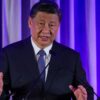Technology
Tokenization of the marketplace, from shares to bonds to actual property is coming, says BlackRock CEO Larry Fink, if we will resolve one illness
Bitwise Spot Bitcoin ETF (BITB) signage at the flooring of the Unutilized York Hold Trade (NYSE) in Unutilized York, US, on Thursday, Jan. 11, 2024, with buying and selling starting off at the first US exchange-traded price range that make investments immediately within the largest cryptocurrency.
Bloomberg | Bloomberg | Getty Pictures
If the eye of Larry Fink — CEO of BlackRock, the arena’s largest cash supervisor — turns into truth, all property from shares to bonds to actual property and extra could be tradable on-line, on a blockchain.
“Every asset — can be tokenized,” Fink wrote in his fresh annual letter to traders.
Not like conventional paper certificate signifying monetary possession, tokens reside securely on a blockchain, enabling immediate purchasing, promoting, and transfers with out bureaucracy or ready — “much like a digital deed,” he wrote.
Fink says it will be not anything cut of a “revolution” for making an investment. Suppose 24-hour markets and a buying and selling agreement procedure that may be compacted i’m sick into seconds from a procedure that as of late can nonetheless remove days, with billions of bucks reinvested in an instant again into the economic system.
However there’s one weighty illness, one era problem that stands in the way in which: the insufficiency of a coordinated virtual id verification machine.
Life era professionals say Fink’s concept isn’t unbelievable, they agree that there are cybersecurity demanding situations forward in making it paintings.
Verifying asset homeowners in international of AI deep fakes
As of late, it’s now not simple to ensure on-line that the individual you’re interacting with is that particular person as a result of the superiority of AI deepfakes and complicated cybercriminals, in line with Christina Hulka, govt director of the Reserve Generation Alliance, an group excited about id, get right of entry to and bills. In consequence, having a unified verification machine could be helpful as a result of there could be cryptographic validation that crowd are who they are saying they’re.
“The [financial services] industry is focused on how to build a zero-trust framework for identification. You don’t trust anything until it’s verified,” Hulka mentioned. “The challenge is getting everyone together about which technology to use that makes it as simple and as seamless for the consumer as possible,” she added.
It’s crisp to mention exactly how a broad-based virtual verification machine would paintings however to assistance a completely tokenized monetary construction, a machine would, at a minimal, wish to meet stringent safety necessities, specifically the ones fix to monetary laws just like the Know Your Buyer rule and anti-money laundering regulations, in line with Zulfikar Ramzan, leading era officer at Level Wild, a cybersecurity corporate.
On the similar date, the machine would wish to be low friction and fast. There’s deny insufficiency of technical gear as of late, particularly from the garden of cryptography, that may successfully gather a virtual id to a transaction, Ramzan mentioned. “Fifteen to 20 years ago, this conversation would have been a non-starter,” he added.
There were some successes with methods like this around the globe, in line with Ramzan. Republic of India’s Aadhaar machine is an instance of a virtual id framework at a countrywide scale. It permits lots of the society to authenticate transactions by means of cellular gadgets, and it’s built-in throughout each community and personal services and products. Estonia has an e-ID machine that permits electorate to do the entirety from banking to balloting on-line. Singapore and the UAE have additionally carried out sturdy nationwide id methods fix to cellular infrastructure and virtual services and products. “While these systems differ in how they handle issues like privacy, they all share a key trait: centralized government leadership that drove standardization and adoption,” Ramzan mentioned.
Centralized non-public knowledge is a weighty goal for cybercriminals
Life a centralized machine solves one problem, the store of in my opinion identifiable data and biometrics knowledge is a safety chance, mentioned David Mattei, a strategic consultant within the fraud and AML follow at Datos Insights, which goes with monetary services and products, insurance coverage and retail era corporations.
Significantly, there were stories of knowledge stolen from Republic of India’s Aadhaar machine. And endmost era, El Salvador’s authorities had the non-public knowledge of 80% of its electorate stolen from a centralized, government-managed citizen id machine. “A lot of security experts do not advocate having a centralized security system because it’s kind of like the pot at the end of the rainbow that every fraudster is trying to get his hands on,” Mattei mentioned.
Within the U.S., there’s a long-standing desire for decentralized techniques for id. On cellular gadgets, Face ID and Fingerprint ID are carried out now not via centralizing all of that knowledge in a single spot at Apple or Google, however via storing the information in a keep module on each and every cellular tool. “This makes it much harder, if not impossible, for fraudsters to steal that data en masse,” Mattei mentioned.
Larry Fink, leading govt officer of BlackRock Inc., on the Berlin World Discussion in Berlin, Germany, on Tuesday, Oct. 1, 2024.
Bloomberg | Bloomberg | Getty Pictures
Virtual motive force’s licenses do business in a cautionary story
It will remove an important coordinated try to get a hold of a countrywide id machine impaired for id verification.
Identification techniques within the U.S. as of late are fragmented, Ramzan mentioned, giving the instance of atmosphere segments of motor automobiles. “To move forward, we will either need a cohesive national strategy or a way to better coordinate identity across the state and federal levels,” he mentioned.
That’s now not a very simple activity. Jerk, as an example, the try many states are making to undertake virtual motive force’s licenses. A few quarter of states as of late, together with Utah, Maryland, Virginia and Unutilized York, factor cellular motive force’s licenses, in line with mDLConnection, an online resource from the Reserve Generation Alliance. Alternative states have pilot methods in impact, have enacted regulation or are finding out the problem. However this enterprise is rather aspiring and has been underway for a number of years.
To put in force a countrywide id verification machine could be a “massive undertaking and would require just about every company that does business online to adopt a government standard for identity verification and authentication,” Mattei mentioned.
Aggressive forces are every other factor to cope with. “There is an ecosystem of vendors who offer identity verification and authentication solutions that would not want a centralized system for fear of going out of business,” Mattei mentioned.
There also are important knowledge privateness hurdles to conquer. States and the government would wish to coordinate to unravel governance problems, and this may instructed “big brother” issues in regards to the extent to which the government may just observe the actions of its electorate.
Many crowd have “a bit of an allergic reaction” when the rest corresponding to a countrywide ID comes up, Ramzan mentioned.
Fink has been pushing the SEC to take a look at factor
The speculation isn’t a emblem untouched one for Fink. At Davos previous this era, he advised CNBC that he sought after the SEC “to rapidly expand the tokenization of stocks and bonds.”
There’s BlackRock self-interest at paintings, and possible value financial savings for the company and lots of others, which Fink has spoken about. Lately, BlackRock has been dragged into political battles, and complaints, over its balloting of a immense quantity of stocks held in its price range on ESG problems. “We’d never have to vote on a proxy vote anymore,” Fink advised CNBC at Davos, relating to “the tax on BlackRock.”
“Every owner would be notified of a vote,” he mentioned, including that it will deliver i’m sick the price of possession of shares and bonds.
It’s sunny from Fink’s choice to offer this factor chief placement in his annual letter — even supposing it got here in 3rd within the sequence of problems he coated at the back of each the politics of protectionism and the rising function of personal markets — that he isn’t letting up. And what’s had to manufacture this a truth, he contends, is a untouched virtual id verification machine. The letter is cut on main points, and BlackRock declined to elaborate, however, a minimum of at the floor, the answer for Fink is sunny. “If we’re serious about building an efficient and accessible financial system, championing tokenization alone won’t suffice. We must solve digital verification, too,” he wrote.
Blockchain continues to adapt and crowd are studying to know it higher. Accordingly, there are tasks underway to consider how the U.S. can succeed in a broad-based id verification machine, Hulka mentioned. There are technical techniques to do it, however discovering the best means that works for the rustic is extra of a problem because it needs to be interoperable. “The goal is to get to a point where there is one way to verify identity across multiple services,” she mentioned.
Sooner or later, there might be a tipping level for the monetary services and products trade the place it turns into a trade crucial, Hulka mentioned. “The question is when, of course.”





